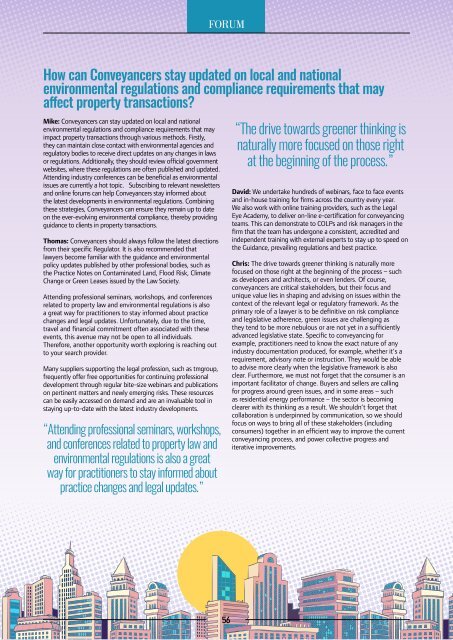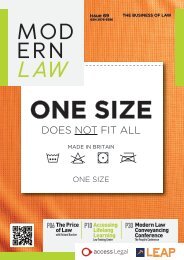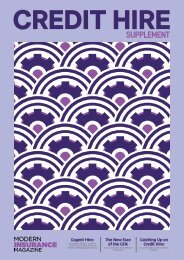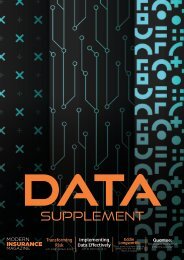Modern Law Magazine Issue 67
You also want an ePaper? Increase the reach of your titles
YUMPU automatically turns print PDFs into web optimized ePapers that Google loves.
FORUM<br />
FORUM<br />
How can Conveyancers stay updated on local and national<br />
environmental regulations and compliance requirements that may<br />
affect property transactions?<br />
Mike: Conveyancers can stay updated on local and national<br />
environmental regulations and compliance requirements that may<br />
impact property transactions through various methods. Firstly,<br />
they can maintain close contact with environmental agencies and<br />
regulatory bodies to receive direct updates on any changes in laws<br />
or regulations. Additionally, they should review official government<br />
websites, where these regulations are often published and updated.<br />
Attending industry conferences can be beneficial as environmental<br />
issues are currently a hot topic. Subscribing to relevant newsletters<br />
and online forums can help Conveyancers stay informed about<br />
the latest developments in environmental regulations. Combining<br />
these strategies, Conveyancers can ensure they remain up to date<br />
on the ever-evolving environmental compliance, thereby providing<br />
guidance to clients in property transactions.<br />
Thomas: Conveyancers should always follow the latest directions<br />
from their specific Regulator. It is also recommended that<br />
lawyers become familiar with the guidance and environmental<br />
policy updates published by other professional bodies, such as<br />
the Practice Notes on Contaminated Land, Flood Risk, Climate<br />
Change or Green Leases issued by the <strong>Law</strong> Society.<br />
Attending professional seminars, workshops, and conferences<br />
related to property law and environmental regulations is also<br />
a great way for practitioners to stay informed about practice<br />
changes and legal updates. Unfortunately, due to the time,<br />
travel and financial commitment often associated with these<br />
events, this avenue may not be open to all individuals.<br />
Therefore, another opportunity worth exploring is reaching out<br />
to your search provider.<br />
Many suppliers supporting the legal profession, such as tmgroup,<br />
frequently offer free opportunities for continuing professional<br />
development through regular bite-size webinars and publications<br />
on pertinent matters and newly emerging risks. These resources<br />
can be easily accessed on demand and are an invaluable tool in<br />
staying up-to-date with the latest industry developments.<br />
“Attending professional seminars, workshops,<br />
and conferences related to property law and<br />
environmental regulations is also a great<br />
way for practitioners to stay informed about<br />
practice changes and legal updates.”<br />
“The drive towards greener thinking is<br />
naturally more focused on those right<br />
at the beginning of the process.”<br />
David: We undertake hundreds of webinars, face to face events<br />
and in-house training for firms across the country every year.<br />
We also work with online training providers, such as the Legal<br />
Eye Academy, to deliver on-line e-certification for conveyancing<br />
teams. This can demonstrate to COLPs and risk managers in the<br />
firm that the team has undergone a consistent, accredited and<br />
independent training with external experts to stay up to speed on<br />
the Guidance, prevailing regulations and best practice.<br />
Chris: The drive towards greener thinking is naturally more<br />
focused on those right at the beginning of the process – such<br />
as developers and architects, or even lenders. Of course,<br />
conveyancers are critical stakeholders, but their focus and<br />
unique value lies in shaping and advising on issues within the<br />
context of the relevant legal or regulatory framework. As the<br />
primary role of a lawyer is to be definitive on risk compliance<br />
and legislative adherence, green issues are challenging as<br />
they tend to be more nebulous or are not yet in a sufficiently<br />
advanced legislative state. Specific to conveyancing for<br />
example, practitioners need to know the exact nature of any<br />
industry documentation produced, for example, whether it’s a<br />
requirement, advisory note or instruction. They would be able<br />
to advise more clearly when the legislative framework is also<br />
clear. Furthermore, we must not forget that the consumer is an<br />
important facilitator of change. Buyers and sellers are calling<br />
for progress around green issues, and in some areas – such<br />
as residential energy performance – the sector is becoming<br />
clearer with its thinking as a result. We shouldn’t forget that<br />
collaboration is underpinned by communication, so we should<br />
focus on ways to bring all of these stakeholders (including<br />
consumers) together in an efficient way to improve the current<br />
conveyancing process, and power collective progress and<br />
iterative improvements.<br />
What are the potential cost<br />
implications of adopting<br />
environmentally conscious<br />
practices in conveyancing, and<br />
how can these be managed?<br />
Mike: Adopting environmentally conscious practices in<br />
conveyancing can carry potential cost implications, but they<br />
can be managed effectively. Initially, the costs associated with<br />
conducting thorough environmental due diligence, such as<br />
environmental searches and surveys, may increase expenses<br />
in the short term. However, these costs are often outweighed<br />
by the long-term benefits, as they can help identify and<br />
mitigate potential environmental risks that may arise in the<br />
future, saving clients from unexpected expenditures. Investing<br />
in energy-efficient or green property improvements can raise<br />
the upfront costs of a transaction but can lead to reduced<br />
operating expenses over time, benefiting both the environment<br />
and the property owner. Conveyancers can help manage these<br />
costs by reporting to clients about the financial advantages of<br />
environmentally sustainable choices, including potential tax<br />
incentives or energy savings that may be revealed in search<br />
results. By raising the long-term economic benefits of ecofriendly<br />
practices and advising of cost-effective approaches,<br />
Conveyancers can make environmentally conscious transactions<br />
more appealing to their clients.<br />
David: Clearly, there are a number of office, administrative and<br />
facilities management strategies that can drive down a firm’s<br />
operational carbon footprint. Many conveyancing practices and<br />
workflow systems are fully cloud based and there has been a dramatic<br />
reduction in physical paper use. Long gone are the days when the<br />
quality of the conveyance was down to the thickness of the file.<br />
IT managers in firms will understand all of this already and there<br />
are well proven efficiencies that have been delivered. However,<br />
being environmentally conscious as a law firm requires a culture<br />
and mindset that starts at the top and works through the<br />
business consistently.<br />
We have recently become a Certified B Corporation - an 18 month<br />
journey but a really valuable process that shone a light on much<br />
of the work that we had been doing already. While it takes time<br />
and effort to seek certification, it validates all that your firm does<br />
with regard to its impact on the environment, the well-being of<br />
your teams and your contribution to society. A number of law<br />
firms, of varying sizes, are part of the B Corp Community and it<br />
provides a really strong differentiation in the market. This would be<br />
especially the case if your firm has a strong environmental practice<br />
or is making ESG commitments. Becoming B Corp means you are<br />
walking the walk and can avoid any accusations of “greenwashing”.<br />
How can conveyancers collaborate<br />
with other stakeholders, such as<br />
real estate agents and developers,<br />
to promote sustainable development<br />
and green building practices?<br />
Mike: Conveyancers can play a role in promoting sustainable<br />
development and green building practices by collaborating<br />
with other stakeholders in the real estate industry, such as real<br />
estate agents and developers. They can start by participating<br />
in meetings and conferences, where they can exchange ideas,<br />
insights, and expertise with these partners. Conveyancers can<br />
also facilitate open lines of communication to share information<br />
about eco-friendly property listings, green certifications, and the<br />
benefits of sustainable building practices. By working together,<br />
conveyancers, real estate agents, and developers can collectively<br />
drive awareness of sustainable development and environmentally<br />
responsible real estate choices, helping to meet the growing<br />
demand for greener, more sustainable properties in the market.<br />
This collaborative approach ultimately benefits the environment,<br />
property owners, and the whole industry.<br />
David: It is highly likely that conveyancers will have little<br />
direct engagement with developers on sustainable building<br />
materials and construction as this would have been determined<br />
under standard building regs and any additional design/<br />
spec requirements committed by the developer as planning<br />
conditions. However, ahead of that commercial real estate lawyers<br />
will want to advise developer clients on the land quality, site<br />
conditions including disposition to flooding from its topography,<br />
groundwater and drainage. In part, this may determine where<br />
they place sustainable drainage versus development plots.<br />
Energy performance is an increasingly key part of property<br />
attraction now and the role of the EPC and related retrofit costs<br />
on existing older property will be a key discussion between client,<br />
estate agent and the conveyancer in the negotiation. This is<br />
one of the reasons why we include not only the EPC and related<br />
estimated energy improvement costs, but also a comparison to<br />
others in the area to see how it meets up to the local competition<br />
and what it would need to be in order to be attractive for re-sale.<br />
“Being environmentally conscious as a<br />
law firm requires a culture and mindset<br />
that starts at the top.”<br />
56 57
















